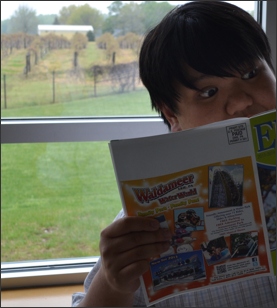| |
Frank Cotolo
February 16, 2017 |
| |
|
Let's face it, the attention span of this year's youngest generation is limited, at best. Teaching
them a subject like the history of the world is near impossible. This is why I worked with a number
of educational experts recently to develop a quick way for the texting generation to comprehend
important historic events. Here is a taste of our new curriculum for teaching the history of the
world.
|
| |
|
Homo Sapiens appear in Africa, having evolved from other creatures, around 250,000 years ago, give
or take a millennium.
|
| |
|
Humans live in tribal families, develop tools and weapons, hunt and learn to kill other humans in
tribal families.
|
| |
|
After around 235,000 years later, some human tribes decide to travel, even though it means a lot of
walking, and the continents become filled with humans (except Antarctica, because it is far too
slippery to walk in it).
|
| |
|
Encouraged by developing tools and weapons and tired of walking from continent to continent, they
learn to build shelters and by now are talking to each other. It is around this time that the first
husband-wife argument occurs.
|
| |
|
 |
|
The last Ice Age ends 10,000 years ago. It forced humans to design protictive clothing, though
most of it poorly fit and lacked sleeves that could be rolled up.
|
| |
|
Humans begin to take small animals, like dogs, into their families. The first pet dog is named
Sparky. For the next 2,000 years, human life doesn't change much.
|
| |
|
Around 8,000 years ago, human tribes stopped killing one another to join forces and create villages
which supported farms that grew food while they still hunted for meat from animals because they
became attached to many of the animals they used for meat. Besides, things grown from the ground
were easier to kill.
|
| |
|
Along with a larger population came diseases and then Mesopotamian and Egyptian cities, art, complex
language, math, science, strange beliefs and before anyone knew it, the date was 4,000 B.C., though
they did not call it B.C. yet. Then civilizations developed in Asia and Greece, where the creation
of philosophy causes the first suicides as well as the Olympics and primitive performance enhancers.
|
| |
|
Rome becomes the center of civilization by violently taking over other territories. Was is created,
as architecture thrives. Then, Rome decides to count the number of people in its empire (the first
census) and calls it Year One, creating a calendar just as Christianity rises and its followers
meet with followers of Judaism to rewrite the history of the world.
|
| |
|
When the Roman Empire falls to the Huns, the world becomes re-populated and new civilizations
flourish until there are at least one billion humans on the planet, most of them poor.
|
| |
|
...to be continued.
|
| |
| Frank Cotolo can be found hosting the talk and interview programme Cotolo Chronicles. You
can send him an e-mail at this address: frank@148.ca.
|





 Copyright © 2009-2017 SRN Mediaworks Productions, in association with Frank Cotolo.
Copyright © 2009-2017 SRN Mediaworks Productions, in association with Frank Cotolo.